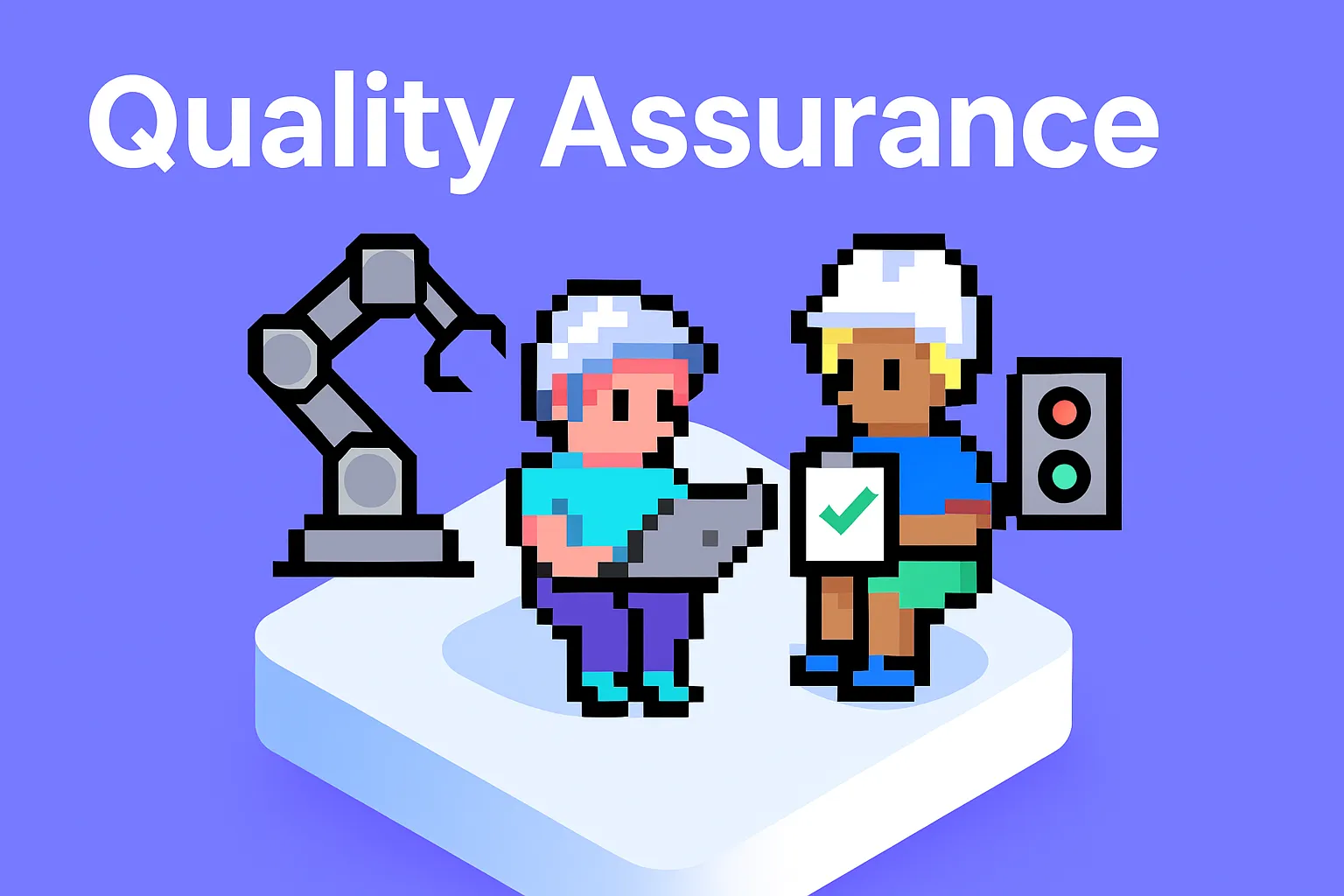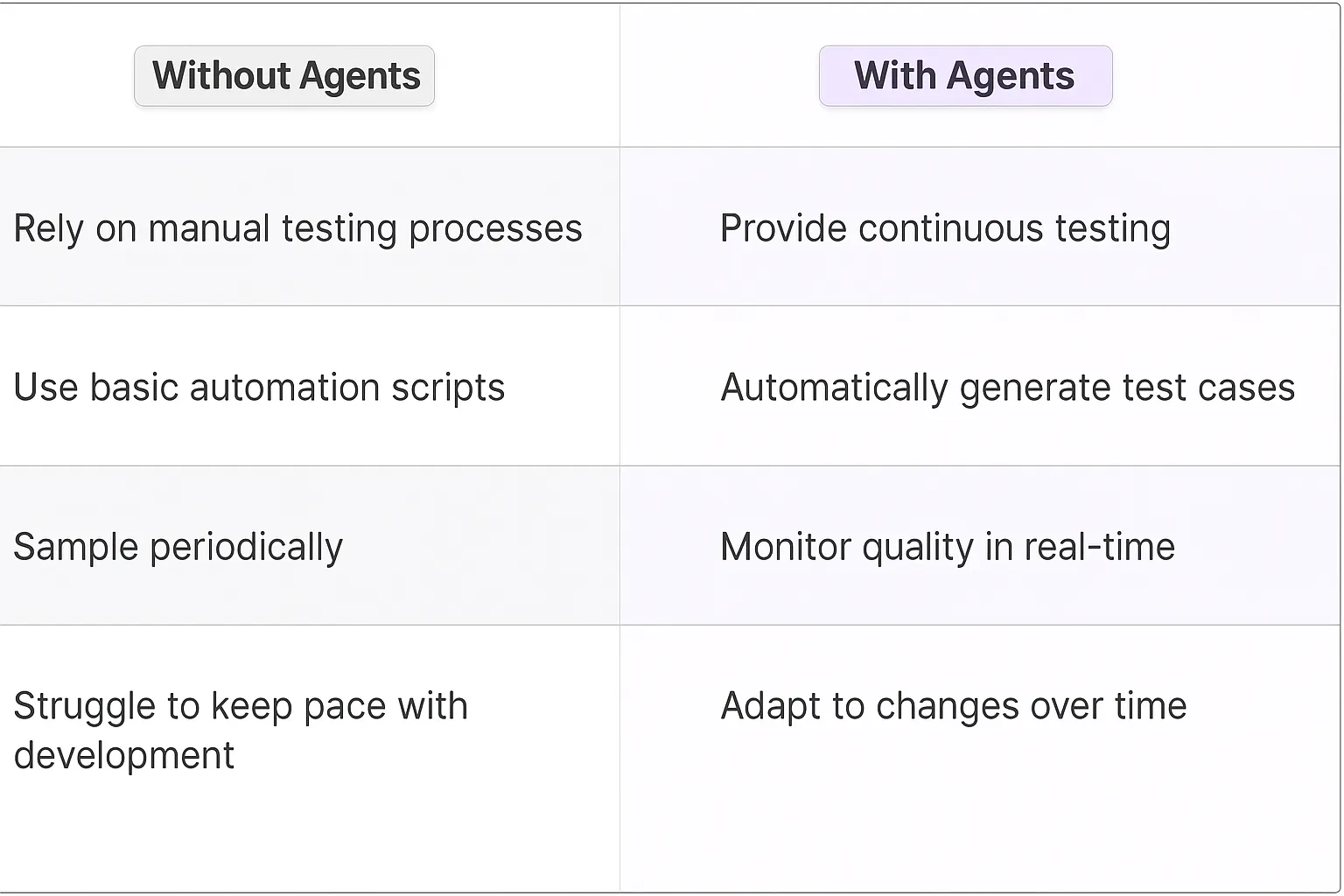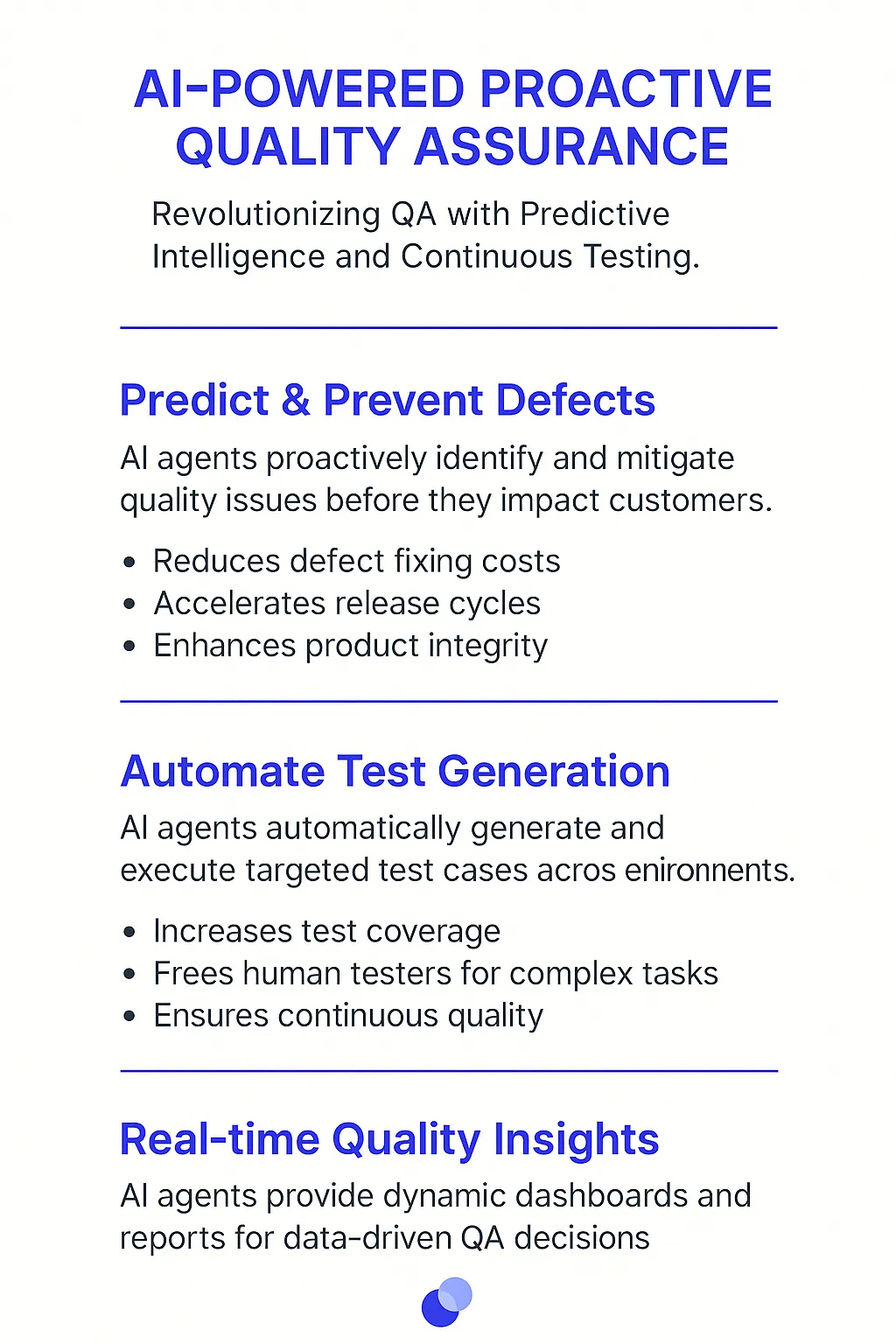A Quality Assurance (QA) Manager is a professional responsible for overseeing and implementing quality control processes within an organization. Their primary objective is to ensure that products or services meet established quality standards before they reach customers.
Key responsibilities of a QA Manager typically include:
QA Managers work across various industries, from software development to manufacturing, adapting their skills to the specific needs of their sector. They play a crucial role in maintaining product integrity, enhancing customer satisfaction, and protecting the company's reputation by preventing defective products or subpar services from reaching the market.

Before AI agents entered the scene, quality assurance managers were stuck in a world of manual processes and limited tools. They'd spend countless hours poring over spreadsheets, juggling multiple testing tools, and trying to piece together disparate data sources. It was like trying to solve a 1000-piece puzzle with half the pieces missing and a blindfold on.
QA managers relied heavily on human testers, which often led to inconsistent results and missed edge cases. They'd use basic automation scripts for repetitive tasks, but these were inflexible and required constant maintenance. Reporting was a nightmare - pulling data from various sources, creating charts in Excel, and praying that nothing broke before the big presentation.
Enter AI agents, the digital teammates that are transforming the QA landscape. These aren't your run-of-the-mill chatbots; we're talking about sophisticated systems that can analyze code, predict potential issues, and even generate test cases on the fly.
One of the biggest game-changers is predictive analytics. AI agents can sift through mountains of historical data to identify patterns and predict where bugs are likely to occur. This allows QA managers to focus their team's efforts on high-risk areas, dramatically improving efficiency and catch rates.
AI agents also excel at continuous testing. They can run tests 24/7, across multiple platforms and configurations, without getting tired or making careless mistakes. This level of coverage was simply impossible with human testers alone.
But here's where it gets really interesting: AI agents are learning machines. They improve over time, adapting to your specific codebase and development practices. It's like having a QA expert who gets smarter with every test run and never takes a vacation.
For QA managers, this means a shift from reactive firefighting to proactive quality management. They can now spend more time on strategic initiatives, like improving overall software architecture or implementing new testing methodologies.
The reporting capabilities of AI agents are also next-level. They can generate real-time dashboards and insights that make it easy to communicate the state of quality to stakeholders. No more late nights cobbling together reports - the data is always at your fingertips, ready to be sliced and diced however you need it.
Perhaps most importantly, AI agents are enabling QA managers to keep pace with the breakneck speed of modern development cycles. In a world of continuous deployment and microservices, traditional QA methods simply can't keep up. AI agents provide the scalability and agility needed to ensure quality in these fast-paced environments.
The bottom line? AI agents are not just tools; they're force multipliers for QA managers. They're expanding what's possible in software quality assurance, allowing teams to catch more bugs, ship faster, and deliver better experiences to end-users. And we're just scratching the surface of what's possible. As these systems continue to evolve, they'll reshape not just QA, but the entire software development lifecycle.

Quality Assurance Managers are the unsung heroes of product development, ensuring that every piece of software, hardware, or service meets the highest standards before it reaches the end-user. AI agents are poised to become their indispensable digital teammates, augmenting human capabilities and transforming the QA landscape.
These AI-powered allies can revolutionize how QA managers approach their work, from test case generation to defect prediction and beyond. They're not just tools; they're cognitive partners that learn, adapt, and improve over time, much like a seasoned QA professional.
The integration of AI agents into the QA process isn't just about automation; it's about amplification. These digital teammates don't replace human QA managers; they enhance their capabilities, allowing them to focus on higher-level strategic thinking and complex problem-solving.
As AI technology continues to evolve, we can expect these agents to become even more sophisticated, potentially developing the ability to understand and test for subjective quality factors like user experience and emotional response. The future of QA is not just about finding bugs; it's about ensuring holistic product excellence, and AI agents are the key to unlocking this potential.

Quality Assurance Manager AI agents are reshaping how businesses approach quality control across diverse sectors. These digital teammates bring a level of precision and consistency that's hard to match with human efforts alone. Let's dive into some industry-specific scenarios where these AI agents are making waves:
In manufacturing, QA Manager AI agents are becoming the unsung heroes of production lines. They're not just catching defects; they're predicting them before they happen. These agents analyze patterns in production data, identifying subtle shifts that might lead to quality issues down the line. It's like having a crystal ball for product quality, but one that's powered by algorithms instead of magic.
For software development teams, QA Manager AI agents are the ultimate code reviewers. They tirelessly scan through lines of code, spotting potential bugs and security vulnerabilities that even the most caffeinated developers might miss. These digital teammates don't just flag issues; they suggest fixes and learn from each review, continuously improving their ability to catch even the most elusive bugs.
In the food and beverage industry, QA Manager AI agents are the taste testers that never get palate fatigue. They analyze chemical compositions and sensory data to ensure consistency in flavor profiles across batches. It's like having a super-taster on your team, one that can detect the slightest deviation in your secret sauce recipe.
These use cases are just the tip of the iceberg. As we explore further, you'll see how QA Manager AI agents are becoming indispensable across industries, raising the bar for quality control standards and operational excellence.
The manufacturing industry is ripe for a quality assurance revolution, and AI agents are leading the charge. Let's dive into how these digital teammates are transforming the role of Quality Assurance Managers in factories across the globe.
Picture a bustling automotive plant. Traditionally, QA managers would rely on spot checks and manual inspections to maintain product standards. It's a time-consuming process prone to human error. Enter the QA Manager AI Agent – a tireless, ever-vigilant guardian of quality.
These AI agents integrate with existing production line cameras and sensors, analyzing every single product in real-time. They're not just looking for obvious defects; they're picking up on subtle variations that might escape even the most experienced human eye. Micro-fractures in metal components, slight color inconsistencies in paint jobs, or minuscule misalignments in assembly – nothing gets past these digital quality hawks.
But here's where it gets really interesting. These AI agents aren't just flagging issues; they're learning and adapting. They're building a comprehensive understanding of what "normal" looks like for each product, and they're getting smarter with every item that rolls off the line.
For the human QA managers, this is a game-changer. Instead of being bogged down in routine inspections, they're now free to focus on strategic improvements. The AI agents feed them actionable insights – not just raw data, but patterns and trends that can inform process improvements.
And when issues do arise? The AI agents don't just raise an alarm; they suggest potential solutions based on historical data and current conditions. It's like having a team of expert consultants working 24/7, constantly refining and optimizing the production process.
The result? Dramatically reduced defect rates, increased production efficiency, and a level of quality consistency that was previously unattainable. It's not about replacing human expertise – it's about augmenting it, allowing QA managers to operate at a higher level and drive continuous improvement across the entire manufacturing process.
This isn't some far-off future scenario. Forward-thinking manufacturers are already implementing these systems and seeing remarkable results. As these AI agents continue to evolve, they're set to redefine what's possible in quality assurance, pushing the boundaries of manufacturing excellence.
The food and beverage industry is undergoing a massive transformation, and AI agents are at the forefront of this change. These digital teammates are reshaping how Quality Assurance Managers operate, bringing unprecedented precision and efficiency to the table.
Take a large-scale brewery, for example. Traditionally, QA managers relied on periodic sampling and sensory evaluations to maintain consistency across batches. It's a process that's both time-consuming and subject to human variability. Now, AI agents are changing the game entirely.
These AI-powered systems integrate with existing brewing equipment, continuously monitoring every stage of the production process. They're not just tracking obvious metrics like temperature and pressure; they're analyzing subtle chemical compositions, detecting minute flavor profile variations, and even predicting how these factors will impact the final product.
What's truly fascinating is how these AI agents learn and adapt. They're building comprehensive models of what makes a perfect brew, considering countless variables that human experts might overlook. With each batch, they're refining their understanding, becoming more adept at predicting and preventing quality issues before they occur.
For QA managers, this technology is a game-changer. Instead of spending hours tasting samples and poring over spreadsheets, they're now armed with real-time insights and predictive analytics. The AI agents flag potential issues early, suggesting adjustments to maintain consistency across batches.
But it doesn't stop at production. These AI agents are also revolutionizing the packaging and distribution phases. They're monitoring fill levels, cap tightness, and label placement with superhuman precision. They're even tracking environmental conditions during shipping, ensuring that the product reaches consumers in optimal condition.
The impact on product quality and consistency is profound. Breweries implementing these systems are seeing significant reductions in batch variations, fewer recalls, and improved customer satisfaction. It's not about replacing the expertise of master brewers and QA professionals – it's about augmenting their skills, allowing them to focus on innovation and continuous improvement.
As these AI agents continue to evolve, they're set to push the boundaries of what's possible in food and beverage quality assurance. They're not just maintaining standards; they're raising the bar, driving the industry towards new levels of excellence and consistency.
This isn't a futuristic concept – it's happening now. Forward-thinking breweries and food manufacturers are already reaping the benefits of these AI-powered quality assurance systems. As the technology matures, we can expect to see it spread across the entire food and beverage industry, transforming how we think about quality control and product consistency.
Implementing a Quality Assurance Manager AI Agent isn't a walk in the park. It's more like trying to teach a robot to taste-test your grandma's secret recipe. The first hurdle? Data quality and quantity. These digital teammates are only as good as the information they're fed. If your data is messy, incomplete, or biased, your QA AI will be about as useful as a chocolate teapot.
Then there's the integration nightmare. Your QA AI needs to play nice with existing systems - test management tools, bug trackers, CI/CD pipelines. It's like introducing a new player to a well-oiled sports team mid-season. The potential for fumbles is high, and the learning curve can be steep.
Let's not forget about the ever-evolving nature of software development. Your QA AI needs to keep up with new technologies, frameworks, and methodologies. It's like trying to hit a moving target while riding a unicycle. Blindfolded.
On the operational front, we're dealing with a whole different beast. First up: the human factor. Your flesh-and-blood QA team might view this AI as a threat, not a teammate. It's like bringing a robot to a family dinner - there's bound to be some awkward silences and suspicious glances.
Then there's the question of trust. Can we really rely on an AI to catch all the bugs? What about those edge cases that require human intuition? It's like trusting a GPS in a city with constant road works - you might end up in a dead-end more often than you'd like.
Governance is another can of worms. Who's responsible when the AI misses a critical bug? How do we ensure it's making decisions ethically and in line with company values? It's like giving a toddler the keys to your car - you need some serious ground rules and safeguards in place.
Lastly, there's the challenge of continuous improvement. Your QA AI needs to learn from its mistakes and adapt to new scenarios. It's not just about maintaining the AI; it's about evolving it. Think of it as raising a digital child - it needs constant attention, guidance, and occasionally, a firm hand to keep it on the right track.
Quality Assurance Manager AI agents are not just a trend; they're the future of software quality assurance. These digital teammates are redefining what's possible in QA, enabling teams to catch more bugs, ship faster, and deliver superior user experiences. As AI technology continues to evolve, we can expect these agents to become even more sophisticated, potentially developing abilities to understand and test for subjective quality factors.
However, it's crucial to remember that AI agents are not replacements for human QA managers. Instead, they're powerful tools that augment human capabilities, allowing QA professionals to focus on strategic thinking and complex problem-solving. The most successful QA teams will be those that effectively integrate AI agents into their workflows, leveraging the strengths of both human intuition and machine intelligence.
As we move forward, the role of QA managers will evolve. They'll need to become adept at working alongside AI, interpreting its insights, and using them to drive continuous improvement in software quality. The future of QA is not just about finding bugs; it's about ensuring holistic product excellence, and AI agents are the key to unlocking this potential.